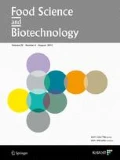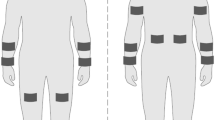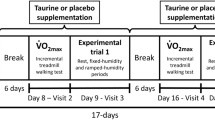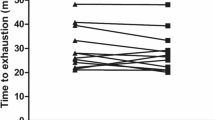Abstract
This study measured caffeine-induced changes in activated sweat gland density (ASGD) and fat oxidation using a randomized crossover design with 10 healthy volunteers given caffeine (Caffe-I, 3 mg/kg ingested 30 min before experiment) and non-caffeine (No-Caff). Subjects were 173.0±3.2 cm in height, 72.5±4.3 kg in weight, and 21.5±2.5 years in age. All experiments were performed in an automated climate chamber (24.0±0.5°C, relative humidity 50±3%, air velocity less than 1 m/sec) between 2–5 p.m. The ASGD on the chest, upper arm, upper back, and lower back were measured (after 30 min running at 60% VO2max), and blood samples were taken (at 40 min before, immediately before and after 30 min running). Activated sweat gland density levels were higher in Caffe-I (Chest p<0.05 and U-Back p<0.01) and free fatty acids (FFA) were higher in Caffe-I compared to No-Caff immediately before (p<0.05) and after running (p<0.01). In summary, caffeine increases ASGD and FFA by stimulating the sympathetic nervous system and increasing of lipolysis.
Similar content being viewed by others
References
Hursel R, Westerterp-Plantenga MS. Thermogenic ingredients and body weight regulation. Int. J. Obesity 34: 1–11 (2010)
Dulloo AG, Seydoux J, Girardier L. Potentiation of the thermogenic antiobesity effects of ephedrine by dietary methylxanthines: Adenosine antagonism or phosphodiesterase inhibition? Metabolism 41: 1233–1241 (1092)
Dulloo AG, Geissler CA, Horton T, Collins A, Miller DS. Normal caffeine consumption: Influence on thermogenesis and daily energy expenditure in lean and postobese human volunteers. Am. J. Clin. Nutr. 49: 44–50 (1089)
Astrup A, Toubro S, Cannon S, Hein P, Breum L, Madsen J. Caffeine: A double-blind, placebo-controlled study of its thermogenic, metabolic, and cardiovascular effects in healthy volunteers. Am. J. Clin. Nutr. 51: 759–767 (1090)
Bracco D, Ferrarra JM, Arnaud MJ, Jéquier E, Schutz Y. Effects of caffeine on energy metabolism, heart rate, and methylxanthine metabolism in lean and obese women. Am. J. Physiol. 269: E671–E678 (1095)
Cabanac M. Temperature regulation. Annu. Rev. Physiol. 37: 415–439 (1075)
Lee JB, Bae JS, Matsumoto T, Yang HM, Min YK. Tropical Malaysians and temperate Koreans exhibit significant differences in sweating sensitivity to iontophoretically administered acetylcholine. Int. J. Biometeorol. 53: 149–157 (2009)
Horowitz M. Heat acclimation: A continuum of process. pp. 445–450. In: Thermal Physiology. Mercer J (ed). Elsevier, Amsterdam, Netherlands (1089)
Sato K, Sato F. Pharmacologic responsiveness of isolated single eccrine sweat glands. Am. J. Physiol. 240: R44–R51 (1081)
Torres NE, Zollman PJ, Low PA. Characterization of muscarinic receptor subtype of rat eccrine sweat gland by autoradiography. Brain Res. 550: 129–132 (1091)
Acheson KJ, Gremaud G, Meirim I, Montigon F, Krebs Y, Fay LB, Gay LJ, Schneiter P, Schindler C, Tappy L. Metabolic effects of caffeine in humans: Lipid oxidation or futile cycling? Am. J. Clin. Nutr. 79: 40–46 (2004)
Graham TE. Caffeine and exercise: Metabolism, endurance, and performance. Sports Med. 31: 785–807 (2001)
Arthur C, Guyton MD. Textbook of Medical Physiology. 12th ed. W.B. Saunders Press, Philadelphia, PA, USA. pp. 928–929 (2006)
Lin AS, Uhde TW, Slate SO, McCann UD. Effects of intravenous caffeine administered to healthy males during sleep. Depress. Anxiety 5: 21–28 (1097)
Nicholson SA. Stimulatory effect of caffeine on the hypothalamopituitary-adrenocortical axis in the rat. J. Endocrinol. 122: 535–543 (1089)
Van Soeren M, Mohr T, Kjaer M, Graham TE. Acute effects of caffeine ingestion at rest in humans with impaired epinephrine responses. J. Appl. Physiol. 80: 999–1005 (1096)
Chesley A, Howlett RA, Heigenhauser GJ, Hultman E, Spriet LL. Regulation of muscle glycogenolytic flux during intense aerobic exercise after caffeine ingestion. Am. J. Physiol. 275: R596–R603 (1098)
Mohr T, Van Soeren M, Graham TE, Kjaer M. Caffeine ingestion and metabolic responses of tetraplegic humans during electrical cycling. J. Appl. Physiol. 85: 979–985 (1098)
Greer F, Friars D, Graham TE. Comparison of caffeine and theophylline ingestion: Exercise metabolism and endurance. J. Appl. Physiol. 89: 1837–1844 (2000)
Friedlander AL, Casazza GA, Horning MA, Usaj A, Brooks GA. Endurance training increases fatty acid turnover, but not fat oxidation, in young men. J. Appl. Physiol. 86: 2097–2105 (1099)
Friedlander AL, Jacobs KA, Fattor JA, Horning MA, Hagobian TA, Bauer TA, Wolfel EE, Brooks GA. Contributions of working muscle to whole body lipid metabolism are altered by exercise intensity and training. Am. J. Physiol. Endocr. M. 292: E107–E116 (2007)
Romijn JA, Coyle EF, Sidossis LS, Gastaldelli A, Horowitz JF, Endert E, Wolfe RR. Regulation of endogenous fat and carbohydrate metabolism in relation to exercise intensity and duration. Am. J. Physiol. 265: E380–E391 (1093)
Wolfe RR, Klein S, Carraro F, Weber JM. Role of triglyceride-fatty acid cycle in controlling fat metabolism in humans during and after exercise. Am. J. Physiol. 258: E382–E389 (1090)
Greer F, Hudson R, Ross R, Graham T. Caffeine ingestion decreases glucose disposal during a hyperinsulinemic-euglycemic clamp in sedentary humans. Diabetes 50: 2349–2354 (2001)
Esler M, Lambert G, Brunner-La Rocca HP, Vaddadi G, Kaye D. Sympathetic nerve activity and neurotransmitter release in humans: Translation from pathophysiology into clinical practice. Acta Physiol. Scand. 177: 275–284 (2003)
Author information
Authors and Affiliations
Corresponding author
Rights and permissions
About this article
Cite this article
Kim, TW., Shin, YO., Lee, JB. et al. Effect of caffeine on the metabolic responses of lipolysis and activated sweat gland density in human during physical activity. Food Sci Biotechnol 19, 1077–1081 (2010). https://doi.org/10.1007/s10068-010-0151-6
Received:
Revised:
Accepted:
Published:
Issue Date:
DOI: https://doi.org/10.1007/s10068-010-0151-6




